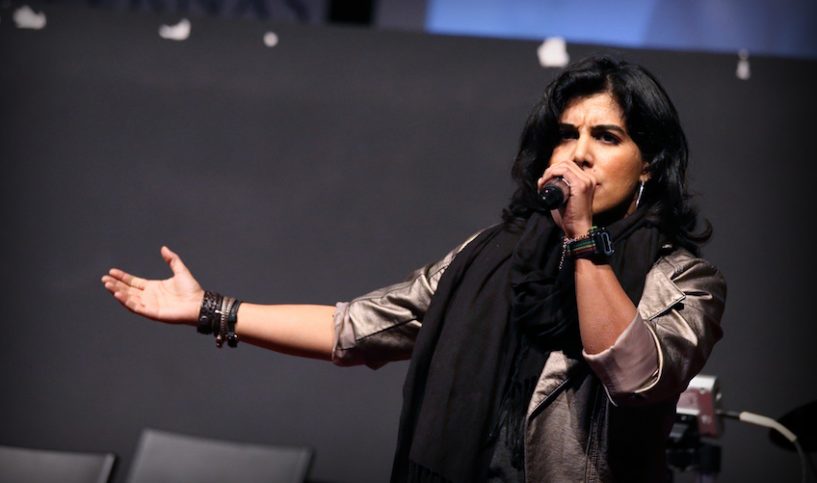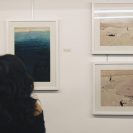Anyone who knows of the illustrious author and poet Nada Faris could easily find her riveting career profile online, along with endless accolades about her work. She is surely known as “Kuwait’s finest”, but for Nada, the journey means much more than arriving as a success in the eyes of her fans. Her drive to spread a message of hope, change and collaboration is what keeps her going. Be it through her work, on stage or off, her social media presence, and the projects she chooses to support.
“If you’re alive, then you need to do it [life] your own way, and it has to be meaningful.” She started off our discussion with this decisive statement. “When I first knew that I wanted to pursue a career in the arts, I did everything in my own power to see my vision through.” Indeed, she did; from changing majors during university, starting up cultural events, winning poetry slams, performing her work on stage, publishing books, to gaining recognition in the international area. Her accomplishments are plentiful, but in Nada’s mind, she is still on her way. She added, “Through my work, I am to build an environment that allows us all to discuss anything and everything, and even argue, in a safe space that allows for true dialogue.”
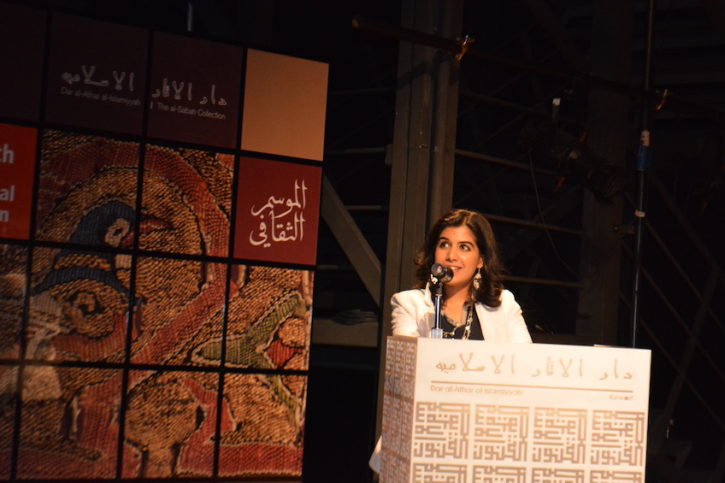
Photo By Dalal Al-Doub
We switch up the pace of our discussion to examine Kuwait’s creative landscape fourteen years ago, back when Nada was getting started with her own journey. “The challenges were different, as we didn’t have much to work with in terms of a creative industry” she commented, “Today, we have options. Someone may graduate with an English Literature degree and work in fashion. Yet, we somehow don’t understand the value of the present.” Nada always had a vision for Kuwait and its creative community, it is truly what pushes her to constantly produce work that examine our society’s nuances. “We tend to glorify the past, and we are always trying to bring back values we think we lost. My question is, how are we going to do that if we don’t acknowledge what is happening in the country today?”
Her answer might be simplistic, but its impact is most certainly not. “Problems help us grow, and we can surely find solutions through the arts and determining the values that are good for our country. I believe that the biggest challenge is how we utilize language, be it English or Arabic. If we focus on what’s going to be good for the country—it’s all the same thing. It is a set of universally shared values. Let’s create values that other countries want to emulate.”
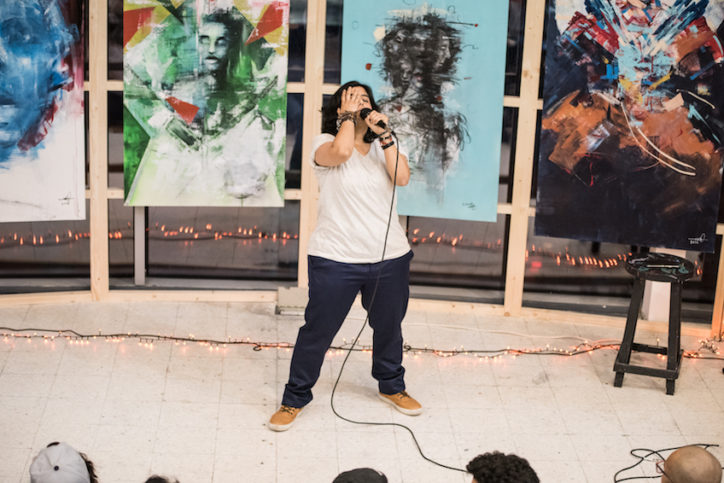
Photo By Abdulaziz Safar Ali
Her statement is indicative of her journey. While Nada firstly identifies as a Kuwaiti author, she aimed to showcase the types of values she wants for her country through her work. She chose to reach for a global audience, educating the world with Anglowaiti literature (a term she aptly coined), to shift the national discourse. “Being a Kuwaiti who writes in English, or Arabic, is not mutually exclusive.” She continued, “We are not one or the other, and we shouldn’t worry ourselves with labels. We are privileged in Kuwait to have facilities that are now more accessible for upcoming writers—that is one of my goals, and I’m thrilled to see the change.” If anything, the space for the creative arts in Kuwait continues to grow. We see artists and performers all around us, we are even at a point where we can say that we are unsure of which event to attend, or which cause to support, on any given day.
Nada remarkably considers herself to be a personal strategist with a mission to keep this movement going. “Everything I do is a part of it. I want to transform society through culture to make it more tolerant, democratic and sovereign—we don’t have to be afraid of language and its power anymore.”
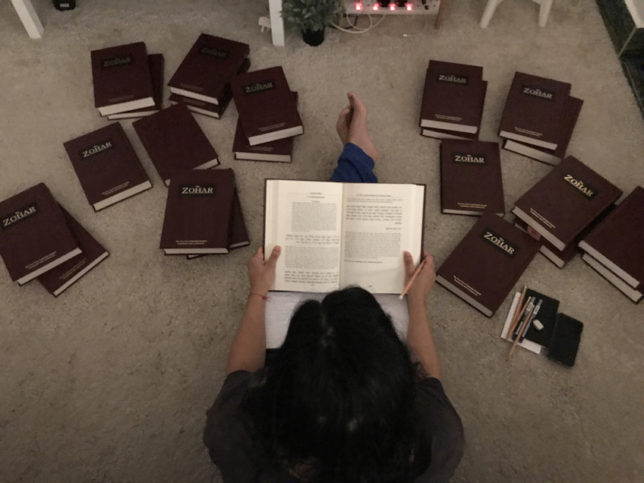
Photo by Abdulmehsen AlFares
UP CLOSE AND PERSONAL QUESTIONNAIRE
What do you most value in your friends?
Honesty, kindness and ambition. I prefer to spend time with people who are very motivated, but whose motivation lies in their desire to improve themselves and the world around them. You want a PhD, a thriving business, millions of followers on Instagram, fans that hold on to your every word – that’s fine, but why? I prefer to spend time with people whose “Why?” is about personal and social change, not individual gains. And by ‘honesty’ I mean people who are not afraid of looking inwardly and recognizing their human flaws. If we can talk candidly about that, we can grow together. I’m interested in friends with whom I can evolve.
What is your idea of perfect happiness?
I can sum up my idea of perfect happiness in another three terms: transcendence, value, and genuine interactions.
What is your greatest fear?
That I never live up to my potential.
What is the trait you most deplore in yourself?
It’s hard to pick just one! Let’s see. I hate the following: my victim consciousness, my self-righteousness, my anger, my mood swings, my lack of belief in myself, and how easy it is for me to quit, procrastinate, or otherwise sabotage the very things for which I yearn.
If I were to pick the one I deplore the most, it’ll be my inability to see my worth at times.
What is the trait you most deplore in others?
Their lack of appreciation of Britney Spears. Just kidding! It felt like it got too serious there all of a sudden. Now to be brutally honest, what I deplore in myself, I obviously deplore in others. Hence, for me, the most heinous quality in others is their inability to recognize their own worth (and acting out in hurtful ways to compensate or mask their insecurities).
Which living person do you most admire?
I know you’re asking for a living person, but I respect people who face death or the possibility of dying and still remain true to their principles (such as Malala or Asrar Al-Qabandi), and phoenixes who fail in business but rise up from the ashes and change the world (such as Steve Jobs and Elon Musk).
I am also attracted to redemption stories (like Nelson Mandela’s or Alvaro Munera’s), and stories of social and cultural transformation (like Susan B. Anthony’s, or Tawakkol Karman’s). Honestly, I am drawn to any story where human beings tap into their inner strength and defeat the odds – but I never idolize people, or place any human being on a pedestal. In other words, I admire what they do not their representations in the media, so I cannot pick a living person that I admire. We’re all flawed at the end of the day. We’re all grappling with demons. But we’re also capable of miraculous achievements. That’s what I appreciate in people, living or dead.
What is your greatest extravagance?
Books. And lately, traveling (so I can buy more books).
Which words or phrases do you most overuse?
“Listen to me.” “I know.” “Didn’t I tell you so?” – Obviously, I need to work on my humility. (Or people can just listen to me!).
What is it that you most dislike?
When I succumb to a mood swing and it prevents me from being creative, productive or generous for months.
Which talent would you most like to have?
I want two.
I want to sing and play musical instruments; and I want to draw and paint.
If you could have any job, what would it be?
I’m already doing it: performing, writing, lecturing, reading, and collaborating with likeminded individuals. I suppose I just wish I got paid more for it! Come on Kuwait! We can make it happen.
What would you consider your greatest achievement?
Forgiving myself and my parents.
What is your most treasured possession?
I’m learning to let go of my attachments to possessions. But I suppose I’d say my laptop because it contains my writing.
What is your most marked characteristic?
I’d say my charm and sense of humor, but I’m sure others would choose my height.
Where would you most like to live?
At this stage in my life, that would be New York.
What are your favorite words to live by?
Am I closer to my goals today than I was yesterday?
Nada Faris’s latest book, Fountain of Youth is the 2016 Vine Leaves Vignette Collection Award Semi-Finalist and is available from Vine Leaves Press. For more information about the author, please visit www.nadafaris.com.



